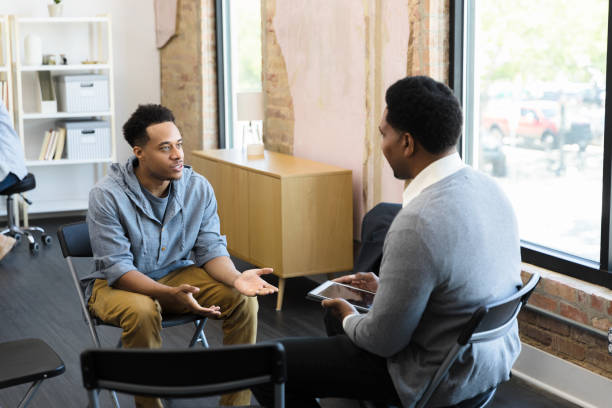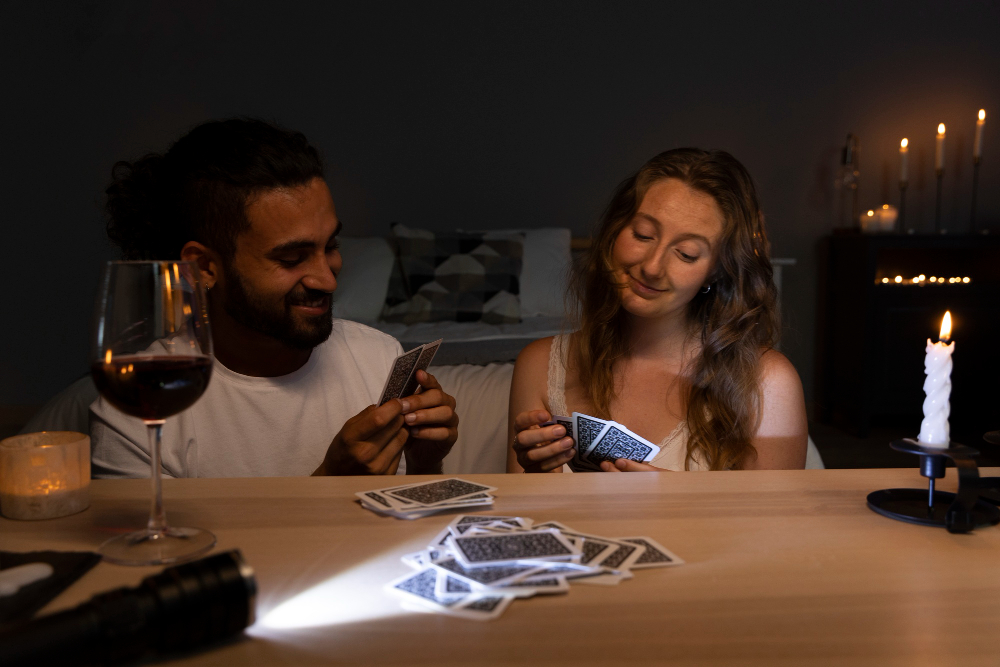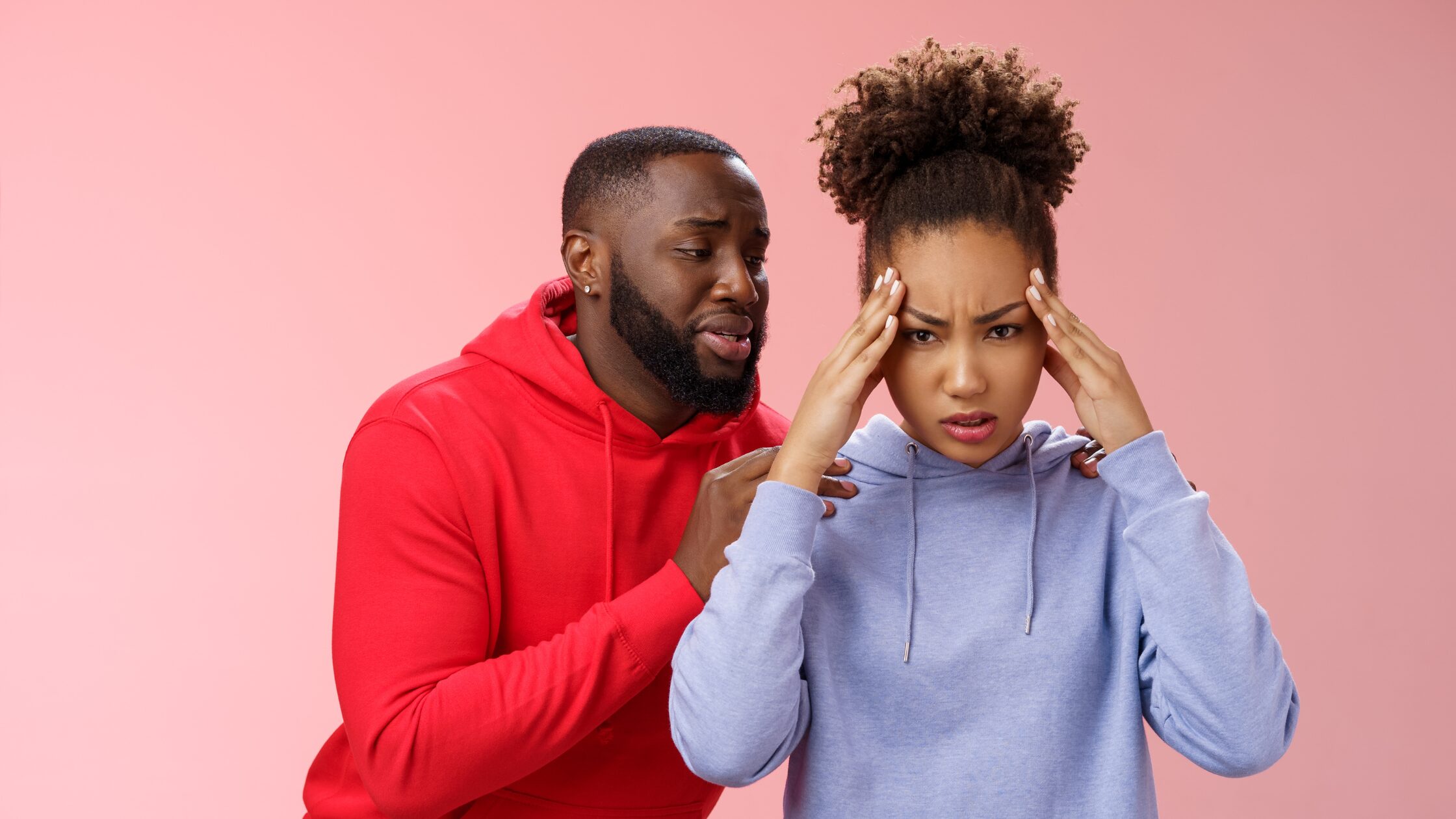Six months after Zara walked away, Marcus thought he’d hit rock bottom but he was wrong.
If you missed how it all began, catch up with Episode 1: The Weight of Losing What You Never Knew You Had.
Rock bottom came on a Thursday evening in March, when he was walking across campus after his Organizational Behavior class and heard that laugh—the one that used to be the soundtrack to his happiest memories. He turned instinctively, his heart doing that familiar flutter it always did at the sound of Zara’s joy.
She was sitting on the steps of the student center with three of her friends, animated in a way he hadn’t seen in months before their breakup. Her hair was different—shorter, with subtle highlights that caught the late afternoon sun. She looked… radiant. Happy. Completely and utterly fine.
And beside her, close enough that their knees were touching, sat someone Marcus didn’t recognize. A guy with kind eyes and an easy smile, who was listening to Zara’s story with the kind of attention Marcus used to give her but had somehow forgotten how to maintain.
Marcus watched… he knew he shouldn’t, but he couldn’t help himself as this stranger leaned in when Zara spoke, how he laughed at the right moments, how he seemed genuinely interested in whatever she was saying. It was like watching someone else be the boyfriend he should have been.
But what broke something inside Marcus wasn’t jealousy, exactly. It was recognition. He was watching Zara receive the kind of attention and care he used to give her naturally, before he’d gotten comfortable and lazy. The stranger wasn’t doing anything extraordinary; he was just being present, engaged and Interested.
All the things Marcus had stopped being.
That night, Marcus called his older sister Tricia for the first time in months.
“I messed up,” he said without preamble when she answered. “I messed up so badly, Tricia, and I don’t know how to fix it.”
“What happened?” Tricia’s voice was gentle, the way it had been when they were kids and he’d come to her with scraped knees and bruised pride.
So Marcus told her everything. About Zara, about how he’d taken her for granted, about how he’d watched her slowly fade away while he’d been too stubborn to see what was happening. About how he’d lost his first love and the best thing that had ever happened to him because he didn’t know how to keep it.
“Marcus,” Tricia said when he finished, her voice careful. “Can I ask you something?”
“Yeah.”
“Do you miss her, or do you miss having her?”
The question hit him like a slap. “What’s the difference?”
“Do you miss Zara… her laugh, her dreams, the way she challenges you to be better? Or do you miss the comfort of knowing someone loved you unconditionally?”
Marcus opened his mouth to insist it was the former, then stopped. Because if he was being honest… really, brutally honest… he wasn’t sure he knew the difference anymore.
The Mirror Moment

That conversation with Tricia haunted Marcus for weeks. He started noticing things about himself he’d never paid attention to before: how he interacted with his friends, his family, and even his professors. He began to see patterns that made his stomach churn.
He was a taker. Not intentionally, not maliciously, but consistently.
His roommate David did most of their cleaning because Marcus “forgot” or was “too busy with school.” His study group relied on him for certain subjects, but he’d gotten comfortable letting others handle the organizational work. Even with his family, he realized he mostly called when he needed something—money, advice, or someone to listen to his problems.
When had he become this person?
The realization hit hard one evening when he was video calling his mother. She was telling him about her week: how exhausting her job at the hospital had been, how his father’s back was acting up again, and how she was worried about his grandmother’s health. Marcus found himself half-listening while scrolling through social media, making the appropriate “mmm-hmm” sounds at what he thought were the right moments.
Then his mother said something that made him look up: “But enough about me, how are you doing, baby? You seem distracted lately.”
Marcus stared at the screen, seeing his mother’s concerned face, and felt something break open in his chest. Here was this woman who had worked a twelve-hour shift, was worried about her husband and mother-in-law, and she was asking about him. Focusing on him. Giving him her full attention despite everything else on her plate.
Just like Zara used to do.
“Mama,” he said suddenly, “when did I become so selfish?”
His mother’s expression softened. “Oh, Marcus. You’re not selfish, baby. You just… you were never taught how to love properly. Men often aren’t.”
“What do you mean?”
She sighed, and Marcus could see her choosing her words carefully. “Your father and I, we love each other deeply. But it took your father years to learn that love is a verb, not just a feeling. He had to learn that caring for someone means thinking about their needs even when they don’t ask. Especially when they don’t ask.”
Marcus felt tears prick his eyes. “How do I learn that? How do I become someone who knows how to love properly?”
“You start by loving yourself properly first,” his mother said gently. “You can’t give what you don’t have, Marcus. And right now, I think you’re so busy trying to be who you think you should be that you’ve forgotten to figure out who you actually are.”
The Work Begins
Marcus started therapy the following week.
It wasn’t easy sitting in Dr. Philip’s office, talking about his relationship with Zara, his family dynamics, and his friendships. Everything felt raw and exposed under the gentle but persistent questioning.
“Tell me about your parents’ relationship,” Dr. Philip said during their third session.
“They love each other,” Marcus replied automatically. “They’ve been married for twenty-five years.”
“That’s not what I asked. Tell me about their relationship. How do they interact? How do they show love?”
Marcus thought about it, really thought about it. “My dad works a lot. He provides for us, always has. My mom… she takes care of everything else. The house, us kids, his parents when they need help. She’s always giving.”
“And how does your father show appreciation for what your mother does?”
Marcus opened his mouth, then closed it. Because now that he really thought about it, his father’s way of showing love was mostly through providing financially and being present for big moments: birthdays, graduations, crises. The day-to-day emotional labor, the small gestures, the consistent attention to needs and feelings… that all fell to his mother.

“Oh,” Marcus said quietly. “Oh no.”
“What are you realizing?”
“I learned how to love from watching my father. But my father… he loves the way men of his generation were taught to love. He provides, he protects, he’s there when things get serious. But the everyday stuff, the emotional care, the attention to small needs…” Marcus put his head in his hands. “I became my father.”
“And how did that work in your relationship with Zara?”
“It didn’t.” Marcus looked up. “She needed a partner, not a provider. She needed someone who saw her, really saw her, every day. Not just during the big moments.”
Dr. Philip nodded. “What do you think it means to really see someone?”
Marcus spent the rest of that session, and many sessions after, learning the answer to that question. It meant noticing when someone was tired without them having to say it. It meant remembering the things that mattered to them. It meant asking questions not because you needed something, but because you were genuinely curious about their inner world.
It meant being present, not just physically, but emotionally and mentally.
Like Marcus, many of us don’t fully understand what we need in love until loss forces us to reflect. If you’re curious about your own patterns, explore The Love Compass for quizzes and insights into your love preferences.
Learning New Patterns
Marcus started small by practicing with the relationships he still had.
He began actually listening when David talked about his day, asking follow-up questions, remembering details from previous conversations. He started doing his share of the cleaning without being asked, noticing when they were running low on groceries, contributing to their shared life in ways that weren’t just financial.
With his study group, he volunteered to take on organizational tasks he’d previously avoided. He started bringing coffee for everyone, remembering how each person liked theirs prepared. Small things, but they mattered.
He called his mother weekly just to check in, with no agenda other than hearing about her life. He asked about her dreams, her fears, her thoughts beyond just her role as his mother. For the first time, he began to see her as a complete person, not just as someone who existed to care for him.
The changes, though subtle, were profound. Marcus began to understand that love—real love—was an active choice made up of thousands of small decisions. It was choosing to pay attention even when you were tired. It was remembering that your partner had a big presentation today and texting to ask how it went. It was noticing their favorite coffee mug was dirty and washing it without being asked.
It was seeing someone fully and choosing to care for them consistently, not just when it was convenient or when you felt like it.
The Glimpse
Eight months after their breakup, Marcus saw Zara at a mutual friend’s birthday party. He almost didn’t go because the thought of seeing her still made his chest tight but his therapist had encouraged him to stop avoiding situations just because they might be uncomfortable.
“Growth happens outside your comfort zone,” Dr. Philip had reminded him.
Zara looked beautiful, as always, but there was something different about her. She seemed more confident, more sure of herself. She was laughing with a group of their old friends, telling some story that had everyone engaged and entertained.
Marcus watched from across the room, not with the desperate longing he’d felt months ago, but with something that surprised him: genuine happiness for her. She looked free in a way she hadn’t during those last months of their relationship, when she’d been carrying the emotional weight for both of them.
“She looks good,” said Jack, one of their mutual friends, appearing beside Marcus with two drinks.
“She does,” Marcus agreed, accepting the drink gratefully.
“Are you okay? Seeing her, I mean.”
Marcus considered the question honestly. “Yeah, I think I am. It hurts, but… she looks happy. She deserves to be happy.”
“That’s growth, man,” Jack said, clapping him on the shoulder. “A few months ago, you would have been plotting ways to get her attention.”
It was true. The old Marcus would have been scheming, trying to find excuses to talk to her, hoping for some sign that she missed him too. This version of himself was content to let her be, to wish her well from a distance.
Near the end of the party, Zara approached him by the drinks table. Marcus’s heart jumped, but he managed to keep his expression calm.
“Hey,” she said, her voice warm but careful.
“Hey. You look really good, Zara. Happy.”
She smiled, and for a moment, it was almost like old times. “Thank you. You look… different. Good different.”
They stood in comfortable silence for a moment, and Marcus realized this was the first time they’d been alone together since that devastating conversation in the coffee shop.

“Marcus,” Zara said finally, “I want you to know… I don’t regret what we had. I learned a lot about myself, about what I need in a relationship. About my own worth.”
“I learned a lot too,” Marcus replied. “Mostly about what I didn’t know about love. About partnership. About being the kind of person someone deserves.”
Zara studied his face, and Marcus saw something shift in her expression. Curiosity, maybe. Or recognition.
“I hope you’re taking care of yourself,” she said softly.
“I am. Finally.” He paused, then added, “I hope whoever makes you laugh like that appreciates how lucky they are.”
Zara’s cheeks flushed slightly. “It’s not… we’re not… it’s complicated.”
Marcus nodded, understanding. “Complicated can be good. It means you’re being careful and choosing wisely.”
“Yeah,” she said, then looked directly at him. “I always said you were smart when you wanted to be.”
They parted that night with a hug that felt like closure and possibility all at once. Marcus went home feeling something he hadn’t felt in months: peace.
The Understanding
In therapy the following week, Marcus tried to articulate what that moment with Zara had meant to him.
“I think I finally understand the difference between missing her and missing having her,” he told Dr. Philip.
“Tell me about that.”
“Missing having her was about my ego, my comfort, my fear of being alone. It was selfish. But seeing her happy, genuinely happy, and feeling glad about it… that’s missing her. Missing her light, her energy, her presence in the world. Wanting good things for her even if I’m not part of them.”
“And how does that feel?”
Marcus thought about it. “Sad, but clean. Like grief instead of self-pity. It hurts, but it’s not bitter anymore.”
“What do you think that shift means for you?”
“I think it means I’m finally learning how to love properly. Not just romantic love, but… all love. Love that puts the other person’s well-being first. Love that celebrates their happiness even when it doesn’t include you.”
Dr. Philip smiled. “That’s a profound realization, Marcus. How do you feel about yourself now?”
“Like I’m becoming someone I actually like,” Marcus said. “Someone I’d want to be friends with. Someone who might actually deserve a second chance, if I ever get one.”
“And if you don’t? If Zara remains happy with someone else?”
Marcus felt the old panic start to rise, then breathed through it the way he’d been practicing. “Then I’ll be sad, but I’ll be okay. Because I’m not the same person who lost his first love anymore. I’m someone who could love her properly now, but I’m also someone who can be happy alone. And that’s… that’s actually everything.”
Marcus is learning what it means to love without condition, to grow without guarantee of reward. But sometimes, the universe has plans that align with our growth. In Episode 3, we’ll discover that second chances often come when we least expect them, and when we’re finally ready for them.








